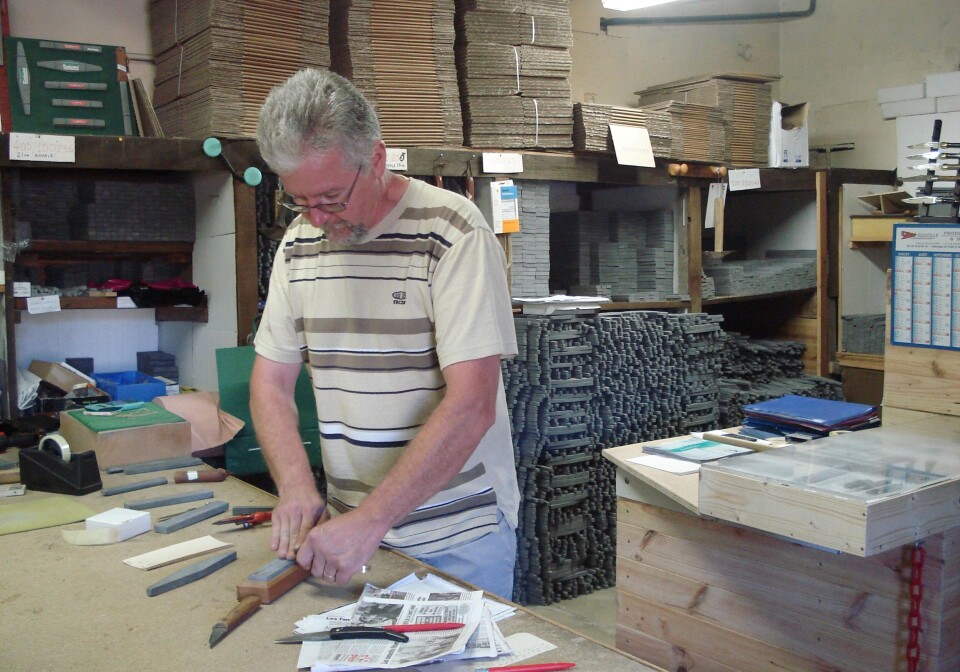-
Step back in time for some ‘dinosaur’ planting in your French garden
Captivated in the garden this month by one species of plant that dates back 200 million years, and another which is one of the oldest flowering plant families on the planet
-
Classic French recipe with an exotic twist: caramelised onion soup
A dish inspired by the travels of two Paris chefs
-
HPI final season: the end of a French TV phenomenon
Comedy-thriller starring Audrey Fleurot that gripped France airs final episodes
France’s last natural whetstone maker battles to keep trade alive
A growing appetite for sustainable, well-crafted products could see the profession cling on despite competition from synthetic alternatives

Hearing Alain Soucille describe his job sounds like a riddle.
“We work stones from quarries but cannot be compared to a quarryman. In the workshop, we chisel stones but cannot be compared to a stone carver.”
The closest description, he supposes, would be ‘mason’ but even that does not quite hit the mark. Mr Soucille, who turns 64 this month, claims to be the last natural whetstone maker in France, and possibly the whole of Europe. His firm has been awarded the status of Entreprise du Patrimoine Vivant (Living Heritage Company) in recognition of its savoir-faire.
He crafts stones designed to sharpen blades, knives, and agricultural tools, all extracted from a nearby quarry in Saurat (Ariège). It is a tough, physical job but rewarding, Mr Soucille says, glancing at the Pyrenees mountain chain, 40 km from the Spanish border, that serves as his outdoor ‘office’ for four months each year.
Read more: ‘We built a €120,000 eco-house for a thrifty retirement in France’
The workshop: where magic unfolds
Mr Soucille only extracts from one small seam of schist, transporting the rocks to his workshop on a truck.
The quarry work takes place over summer, when the land is dry and when workers are less susceptible to slip. This usually runs from May until the end of September, although climate change is drawing out the season into October.
But it is back in Mr Soucille’s workshop that the real magic happens. First, stones are cut down in size to make them easier to work with. Then comes polishing in the berceau (‘cradle’) – the nickname given to the crib-sized machine that pummels and shakes the stones for more than an hour to get nearer the required grain.
The result is close to the coarseness of orange peel and is what has made Mr Soucille’s whetstones so popular in the region. He calls it l’idéal de grain (optimum grain).
The stones have one coarse and one smooth side, obtained from hours of polishing treatment under water using an abrasive strip. Each one should last a lifetime, he says. Prices start from €8.22 for the smallest stone, and the range even extends to teardrop-shaped nail files priced at €17.46, including a leather case.
Read more: Nine tips for managing a French home renovation project yourself
While he now boasts encyclopaedic knowledge of his craft, Mr Soucille came to the career relatively late and, by his own admission, fairly clueless. In 2004, over Sunday lunch with his mother, he happened to browse through a copy of her gardening magazine.
His curiosity was piqued by an article about the quarry because it mentioned one of his clients in the cutlery industry.
At the time, Mr Soucille was running a company selling abrasive and polishing products in Thiers, Puy-de-Dôme, a centre of knife production. “The business was scraping by,” he says. However, when the owners looked for a buyer in 2006, Mr Soucille jumped in, learning on the job and ignoring gloomy forecasts that the trade was in irreversible decline.
Embracing sustainability and artisanship
There are many reasons why, but Mr Soucille traces it back to the industrialisation of farming methods, which turned workers away from the scythe, one of the tools that required sharpening the most.
These days, he also faces stiff competition from synthetic whetstones. His company mainly serves the cutlery industry, but he acknowledges an emerging market is customers looking for sustainable, well-crafted alternatives to mass-market products. Indeed, we featured another person catering to this group in our craft feature in the last edition of The Connexion – a traditional tool-seller.
Following in Mr Soucille’s footsteps is not easy. There is no recognised qualification or training program to become a whetstone-maker. However, Mr Soucille is open to the idea of teaching somebody if they are willing to commit long-term.
One question remains: is it best to sharpen a knife backward or forwards? “Whatever you prefer,” says Mr Soucille. “The most important thing is the angle [around 20°].” While he favours a forward motion, this is a personal choice rather than expert advice. He is not, after all, a cutler.
Related articles
‘Subsidised French cinema keeps art form alive despite Hollywood’
Botched repairs on historic French bridge to be redone by same builder
‘Old French house bricks have a character that is unique’
























